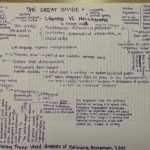
Sam Malain: The Rise of Writing (Intro & Chapter 1)
One of the moments that resonated with me the most when reading Deborah Brandt’s The Rise of Writing: Redefining Mass Literacy was one that was briefly addressed in the class discussion. In the section on ownership Brandt states, “In the workplace, authorship is associated not with writing a text but with managing the writer. The work-made-for-hire doctrine has been the object of considerable commentary by legal scholars” (Brandt 21). During the classroom discussion on this particular section the idea of its relation to students was brought up. The question of where students fall into this model provides for an interesting discussion. Considering students under this model is problematic for a number of reasons the first of which is it contradicts the apparent purpose of the school as an institution. While there have been multiple theorists who posit that schools, as institutions, only serve to model proper behavior in citizens, particularly compliance and the ability to follow orders (I’m thinking Althusser but am not positive I have the right theorist). However, if we take the purpose of the school to enlighten or to facilitate literacy or education for the sake of human betterment, which is the purpose argued by many to be the purpose of schools, then the for-hire model of authorship is deeply problematic. If using the latter model and schools are intended to be places of growth and actual learning, rather than of conditioning and conformity, the notion that the institution is employing a work-for-hire model of authorship goes against the purpose it claims to serve.
The idea that the institution is concerned with managing the writer rather than with the writing itself suggests that while the institution might look to serve a positive function, it really is functioning in a way more akin to Althusser’s model. If the school is concerned with managing the writer and not with facilitating new writing, or ideas, this suggests that the purpose of the institution is to constrain creativity and to create compliant workers intended to churn out texts/works for a power bigger than them (schools, employers, etc…). While it might not be outwardly apparent that this happens in schools, I think most students would testify to the contrary. While there are always going to be constraints on the writing done within a classroom setting, it must fit the curriculum at the very least, these constraints are often taken in unnecessary or seemingly excessive ways. One of the prime examples that comes to mind is students being forced to conform to obtuse writing standards that limit both the content and form of the students’ work. This reinforces traditional literacy practices and asserts that there is only one correct way to write, which in turn reinforces behavior most desirable for traditional capitalistic model of employment in which those who toe the line are much more sought after than those who can creatively problem solve. In short what I am attempting to say is that rigid guidelines, and managing of the writer, serve a purpose if the school is intended to churn out more worker bees for hive, but run counter to purpose of the school if it is supposed to be a place of actual learning and intellectual advancement.






